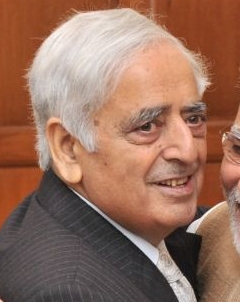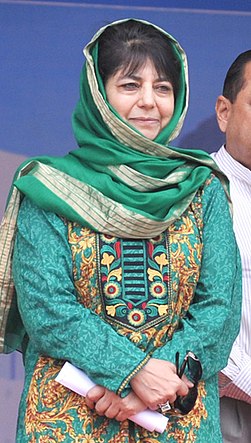
Mufti Mohammad Sayeed was a politician from the Indian state of Jammu and Kashmir. He served twice as the Chief Minister of Jammu and Kashmir, from November 2002 to November 2005 and again from March 2015 to January 2016. He was also Home Minister of India from December 1989 to November 1990. He founded the Jammu and Kashmir Peoples Democratic Party in July 1999 to "persuade the Government of India to initiate an unconditional dialogue with Kashmiris for resolution of the Kashmir problem."

Mehbooba Mufti is an Indian politician of the Jammu and Kashmir Peoples Democratic Party (PDP), who served as the Chief Minister of Jammu and Kashmir from 4 April 2016 to 19 June 2018. She formed a coalition government with the Bharatiya Janata Party (BJP) and resigned on 19 June 2018 after the BJP withdrew from the coalition.

Ghulam Nabi Azad is an Indian politician of the Indian National Congress and was the Minister of Health and Family Welfare. Presently, he serves as the Leader of opposition in Rajya Sabha.

Farooq Abdullah is an Indian politician and chairman of Jammu & Kashmir National Conference. He has served as the Chief Minister of Jammu and Kashmir on several occasions since 1982, and as the union minister for New and Renewable Energy between 2009 and 2014. He is the father of former Chief Minister of Jammu and Kashmir Omar Abdullah.

Omar Abdullah is an Indian politician and the scion of one of the most prominent political families of Jammu and Kashmir, the Abdullah family, he became the 11th and the youngest Chief Minister of the State of Jammu and Kashmir, after forming a government in coalition with the Congress party, on 5 January 2009.

The Jammu & Kashmir National Panthers Party is a state political party in the state of Jammu and Kashmir, India. The party was founded on 23 March 1982 by Prof. Bhim Singh and a few prominent youth political personalities of the time including Jay Mala, former President of the Indian Students Congress. Its aim is to "demolish corruption, communalism, criminalization, drug menace" and to establish a real democracy through ultimate revolution.

The state of Jammu and Kashmir has historically consisted of four political regions. Ladakh towards the east bordering China, Jammu towards the south bordering the states of Himachal Pradesh, Punjab and Pakistan, Kashmir Valley towards the west bordering Pakistan administered Kashmir and Baltistan areas towards the North bordering Xinjiang and Gilgit Baltistan. Baltistan and a part of Kashmir are under Pakistan control. Aksai Chin, claimed by India to be a part of Ladakh, is under Chinese control, while the rest is under Indian control. Pakistan and Indian controlled parts are separated by Line of Control (LOC).
Elections for the Indian state of Jammu and Kashmir were held over seven days in November and December 2008. The previous government led by the Jammu and Kashmir People's Democratic Party (PDP) in coalition with the Indian National Congress (INC) collapsed when the PDP withdrew. Following the election, the Jammu & Kashmir National Conference (NC) agreed a coalition with Congress and their leader, Omar Abdullah became the state's youngest ever Chief Minister at 38.
The All Jammu and Kashmir Plebiscite Front, or Plebiscite Front, was a political party in the Indian state of Jammu and Kashmir that called for a "popular plebiscite" to decide if the state should remain part of India, join Pakistan or become independent. The patron of the party was Sheikh Abdullah, the former Prime Minister of Jammu and Kashmir and chief of the Jammu and Kashmir National Conference, even though he never formally joined it.

The Jammu and Kashmir Legislative Assembly also known as the Jammu and Kashmir Vidhan Sabha is the lower house of the bicameral legislature of the Indian state of Jammu and Kashmir, which is known as the Jammu and Kashmir State Legislature. It has 87 members.

The flag of Jammu and Kashmir is the official flag of the state of Jammu and Kashmir in northern India. It consists of a deep red field, representing labour, charged with a plough to represent agriculture. Three stripes are found on the hoist side and represent the three regions of the state: Jammu, Kashmir and Ladakh.

Elections in Jammu and Kashmir include elections to the Parliament of India, both houses of the bicameral state legislature, and various other local level bodies such as municipalities and Panchayat constituencies. The legal authority to conduct elections in Jammu and Kashmir is drawn from provisions in both the Constitution of India and the Constitution of Jammu and Kashmir.

The Jammu and Kashmir Legislative Assembly election, 2014 was held in the Indian state of Jammu and Kashmir in five phases from 25 November – 20 December 2014. Voters elected 87 members to the Jammu and Kashmir Legislative Assembly, which ends its six-year term on 19 January 2015. The results were declared on 23 December 2014. Voter-verified paper audit trail (VVPAT) along with EVMs were used in 3 assembly seats out of 87 in Jammu Kashmir elections.
Elections for the Indian state of Jammu and Kashmir were held in the early months of 1962. Bakshi Ghulam Mohammad was appointed Prime Minister of Jammu and Kashmir.
Syed Naeem Akhtar Andrabi is an Indian politician from the state of Jammu and Kashmir. He is a member of Jammu and Kashmir Legislative Council as a candidate of the Jammu and Kashmir People's Democratic Party. He is also the minister of public works in the Mehbooba Mufti government.
Elections in India in 1977 included Legislative Assembly elections in several Indian states, including Goa, Himachal Pradesh, Jammu and Kashmir, Tamil Nadu, and West Bengal.














